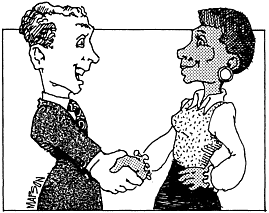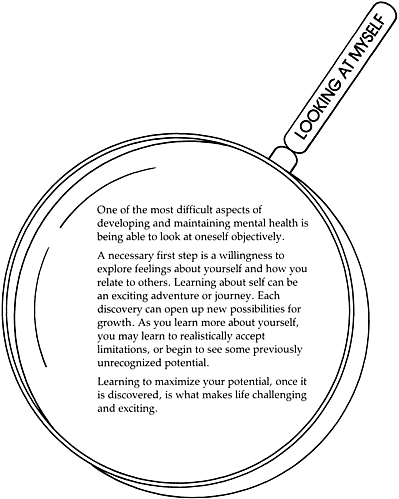In its simplest form, mental health is the capacity
to work (be productive), to love (have friends) and to play (renew one’s
self) with relative freedom from internal stress and without causing
stress to others.
In another sense, mental health is the capacity to cope with all of life, including its joys and sorrows.
Do you consider yourself a mentally healthy person?
Basic Ingredients For Good Mental Health
To understand mental
health, it is important to recognize some of the concepts related to
emotional maturity. Below are criteria that describe an emotionally
mature person. Check those statements you feel are like you.
An emotionally mature person …
|
___ |
1. |
Can fully experience the entire range of human emotions |
|
___ |
2. |
Is able to develop and maintain satisfying relationships with others |
|
___ |
3. |
Sees life as a learning experience that can bring rewards from experience |
|
___ |
4. |
Is free from debilitating fears that unduly restrict risk taking in life |
|
___ |
5. |
Can accept unchangeable reality and make the most of the situation |
|
___ |
6. |
Can accept him or herself in a realistic way |
|
___ |
7. |
Is relatively free from prejudice and able to accept differences in others |
|
___ |
8. |
Is non-blaming of others and is willing to assume personal responsibility |
|
___ |
9. |
Is able to accept emotional support from others as well as appropriately express feelings that give support to others |
|
___ |
10. |
Can rebound from life’s crises without prolonged feelings of stress, grief or guilt. |
If you were able to check
five or more items, you are on your way to emotional maturity. None of
us ever achieves total maturity, so don’t be discouraged if you did not
check all ten statements. Understand that life is an opportunity to
learn and grow.
Emotions And You
Fear, anger, joy, grief, jealousy, love, anxiety and depression are common human emotions.

| |
The emotionally mature
person learns to express
these emotions appropriately. |
Mental Health And Emotions
To a great degree, mental
health is related to how well you manage your emotions. This includes
both feeling good about yourself as well as feeling good about
interactions with your family, friends, colleagues and co-workers. The
ability to experience and express emotions is uniquely human. Our
emotional make-up is that part of us that contributes to the elation of
great joy or the depths of profound sorrow. Emotional adjustment also
contributes to maintaining an evenness through the ups and downs of life
without the demands of experiencing continual extreme highs and/or
lows. Emotions also warn us of danger and give us a way to express and
receive love and affection as well as anger and sorrow.
Most of us know that when
we get physically sick it is usually best to visit a medical doctor.
This person can prescribe treatment that usually alleviates the problem.
Thus, physical illness has a fairly direct relationship between symptom
and cure. The world of emotions is far more complex. For example, many
of us have been taught not to show our emotions. Others somehow have
learned that we should not even have emotions (feelings) about certain
events. Males in particular have frequently received messages from
parents and/or society that “real men” should strictly control their
emotions. The assumption is that the world is better dealt with on the
basis of logic rather than feelings.
Emotions are the
feelings associated with all of the events and activities in our lives.
For example, most people feel grief when a loved one dies. These
feelings are normal, and when experienced fully, they allow the mourner
to adapt to the loss. If we do not know how to experience these feelings
satisfactorily, despair may overtake us. Instead of healing the sense
of loss, it may cause depression that can become chronic and
incapacitating.
By way of another
example, children who are victimized by physical and/or sexual abuse
often carry the scars and stigma of such experiences into adult life.
These “scars” affect the capacity both to express feelings to others as
well as to receive similar feelings in return. Often a layer of guilt,
although unfounded, is part of the complex emotional problems that
persist into adulthood.
All of us deal with our
emotions either destructively or constructively. For some, bottling up
of emotions may result in various physical problems. For others, the
expression of emotions may be inappropriate for the time or situation
and result in negative feedback.
In summary, understanding your emotions and learning how to express your feelings appropriately are signs of emotional maturity.
Looking At My Mental Health

How Is Your Mental Health?
Everyone has a
combination of emotions, attitudes and behaviors which creates a unique
personality. You have considerable control over the items that make up
your personality.
Below is a “pre-test” that
will help you identify several key issues related to mental or
emotional health. Circle the answer that best describes you. Please be
as honest as possible.
My friends would agree that:
|
1. |
I am basically a pessimistic person. |
True |
False |
|
2. |
I frequently wish I were somebody else or had another person’s qualities. |
True |
False |
|
3. |
I find myself frequently angry at people. |
True |
False |
|
4. |
I tend to blame others for my problems. |
True |
False |
|
5. |
I often assume blame for other people’s problems. |
True |
False |
|
6. |
I find it difficult to encourage and support the successes of others. |
True |
False |
|
7. |
It is hard for me to accept encouragement and support from friends or family. |
True |
False |
|
8. |
I do not have many friends. |
True |
False |
|
9. |
I worry constantly about things I cannot change. |
True |
False |
|
10. |
I am frightened about things others do not seem to be concerned about. |
True |
False |
|
This third case study (on the facing page) discusses some of the issues we have covered so far.
Try to anticipate the emotional implications of this case and suggest what can or should be done.
Try to relate this, and all of the cases, to your own situation. |